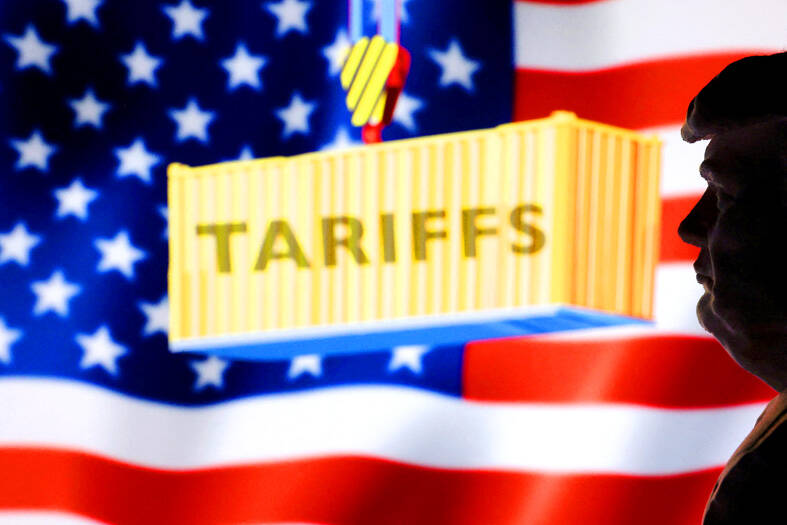Taiwan and the US would hold additional talks on tariffs after representatives of the two sides held their first meeting on Friday, the Office of Trade Negotiations said.
The two sides exchanged views on “reciprocal” tariffs imposed by US President Donald Trump and other issues, such as non-tariff trade barriers and export controls, the office said.
It did not disclose other details about the negotiations, citing a mutual tacit understanding.

Photo: Reuters
President William Lai (賴清德) on Friday said Taiwan was among the first group of countries to enter into tariff negotiations with the US following the tariff announcement that sent ripples through global financial markets.
Taiwan has no intention of launching retaliatory measures, Lai said, adding that the government has sought negotiations with the Trump administration with a goal of “zero tariffs,” modeled after the US-Mexico-Canada Agreement.
Speaking at a Rotary International conference in Taipei yesterday, Lai said Taiwan has officially begun negotiations with the United States on reciprocal tariffs, describing the process as "smooth."
In related developments, the Financial Supervisory Commission (FSC) yesterday said that measures to curb short selling on the local stock market have been extended for another week, as global financial markets continue to face uncertainties from the latest US tariffs.
The FSC last week announced measures, originally effective from Monday to Friday, to cut the limit of intraday sell orders for borrowed securities from 30 percent of the average trading volume of the stock over the previous 30 trading sessions to only 3 percent.
The minimum margin ratio for short-selling on the Taiwan Stock Exchange and the Taipei Exchange would also be raised from 90 percent to 130 percent, the FSC said.
Additionally, the FSC eased limits on the types of collateral that can be used to cover a margin deficit.
Despite those measures, the TAIEX still plunged 1,769.45 points, or 8.31 percent, for the week amid global volatility.
The heavy losses also came despite the NT$500 billion (US$15.29 billion) National Stabilization Fund, which was established by the government in 2000 to serve as a buffer against unexpected external factors that might disrupt the local bourse. It started its intervention on Wednesday.
The measures to limit short selling in the market would remain effective until Friday next week, the FSC said, adding that it would keep a close eye on market conditions at home and abroad, and adjust its policies if necessary.

The Taoyuan Flight Attendants’ Union yesterday vowed to protest at the EVA Air Marathon on Sunday next week should EVA Airway Corp’s management continue to ignore the union’s petition to change rules on employees’ leave of absence system, after a flight attendant reportedly died after working on a long-haul flight while ill. The case has generated public discussion over whether taking personal or sick leave should affect a worker’s performance review. Several union members yesterday protested at the Legislative Yuan, holding white flowers and placards, while shouting: “Life is priceless; requesting leave is not a crime.” “The union is scheduled to meet with

‘UNITED FRONT’ RHETORIC: China’s TAO also plans to hold weekly, instead of biweekly, news conferences because it wants to control the cross-strait discourse, an expert said China’s plan to expand its single-entry visa-on-arrival service to Taiwanese would be of limited interest to Taiwanese and is a feeble attempt by Chinese administrators to demonstrate that they are doing something, the Mainland Affairs Council said yesterday. China’s Taiwan Affairs Office (TAO) spokesman Chen Binhua (陳斌華) said the program aims to facilitate travel to China for Taiwanese compatriots, regardless of whether they are arriving via direct flights or are entering mainland China through Hong Kong, Macau or other countries, and they would be able to apply for a single-entry visa-on-arrival at all eligible entry points in China. The policy aims

Taipei, New Taipei City, Keelung and Taoyuan would issue a decision at 8pm on whether to cancel work and school tomorrow due to forecasted heavy rain, Keelung Mayor Hsieh Kuo-liang (謝國樑) said today. Hsieh told reporters that absent some pressing reason, the four northern cities would announce the decision jointly at 8pm. Keelung is expected to receive between 300mm and 490mm of rain in the period from 2pm today through 2pm tomorrow, Central Weather Administration data showed. Keelung City Government regulations stipulate that school and work can be canceled if rain totals in mountainous or low-elevation areas are forecast to exceed 350mm in

EVA Airways president Sun Chia-ming (孫嘉明) and other senior executives yesterday bowed in apology over the death of a flight attendant, saying the company has begun improving its health-reporting, review and work coordination mechanisms. “We promise to handle this matter with the utmost responsibility to ensure safer and healthier working conditions for all EVA Air employees,” Sun said. The flight attendant, a woman surnamed Sun (孫), died on Friday last week of undisclosed causes shortly after returning from a work assignment in Milan, Italy, the airline said. Chinese-language media reported that the woman fell ill working on a Taipei-to-Milan flight on Sept. 22